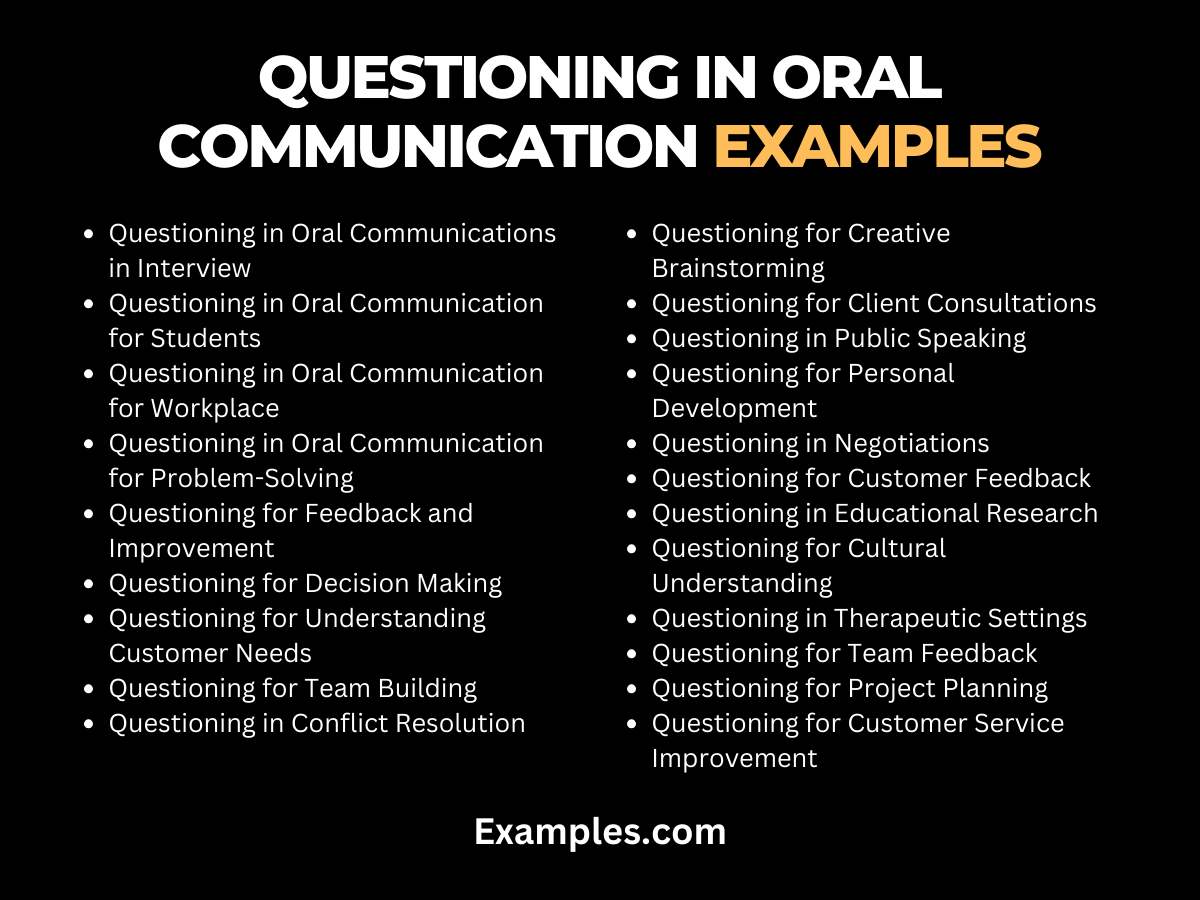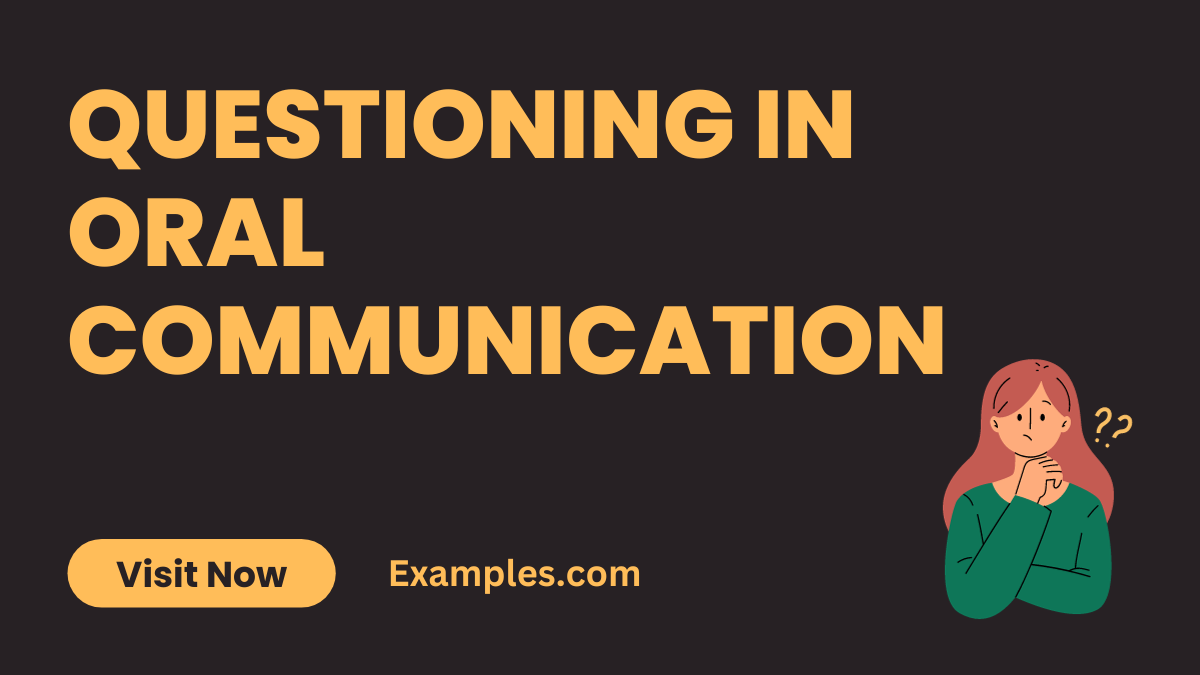29+ Questioning in Oral Communication Examples
In the realm of oral communication, the art of questioning stands as a pivotal tool. This comprehensive guide delves into the myriad of questioning techniques and styles, providing rich communication examples across various contexts. Whether it’s in a classroom, a boardroom, or everyday conversations, understanding how to effectively use questions can transform interactions and deepen understanding. Here, we explore the nuances of questioning, equipping readers with practical examples and insights to enhance their communication skills.
30 Questioning in Oral Communication Examples

Delve into the dynamic world of questioning with these 30 distinct examples of oral communication. Each one showcases a unique approach to crafting and delivering questions in diverse scenarios, from interviews and academic settings to professional and personal interactions. These examples demonstrate how to effectively use questioning to enhance understanding, engagement, and communication outcomes. Rich in practical insights, these examples illustrate the power of questioning as a key element in effective communication, interpersonal communication, and assertive communication strategies.
-
Questioning in Oral Communications in Interview
In interviews, questioning is crucial for assessing a candidate’s suitability. It involves probing their experiences, skills, motivations, and cultural fit.
Example: “How have your previous experiences prepared you for this role?” -
Questioning in Oral Communication for Students
In educational settings, questioning stimulates critical thinking and engagement. It’s about exploring ideas and encouraging participation.
Example: “What do you think is the significance of this historical event?” -
Questioning in Oral Communication for Workplace
In the workplace, questioning is used for clarifying tasks, fostering collaboration, and encouraging innovative thinking.
Example: “Can anyone suggest how we might approach this challenge differently?” -
Questioning in Oral Communication for Problem-Solving
Effective questioning can lead to innovative solutions and clarity in problem-solving situations.
Example: “What alternative solutions could we consider for this issue?” -
Questioning for Feedback and Improvement
Asking for feedback is vital for continuous improvement in any field.
Example: “How can this project be improved for better results next time?”

-
Questioning for Decision Making
Questions in decision-making processes help clarify options and consequences.
Example: “What are the potential impacts of each choice we have here?” -
Questioning for Understanding Customer Needs
In customer service, questions are used to understand and address customer needs effectively.
Example: “Can you describe what features you are looking for in this product?” -
Questioning for Team Building
Questions in team settings can strengthen relationships and foster a collaborative environment.
Example: “How can we leverage each team member’s strengths in this project?” -
Questioning in Conflict Resolution
During conflicts, questioning helps in understanding perspectives and finding common ground.
Example: “Can you explain what led to your perspective on this matter?” -
Questioning for Creative Brainstorming
Questions in brainstorming sessions spark creativity and new ideas.
Example: “What if we approach this problem from a completely different angle?”

-
Questioning for Client Consultations
In consultations, questions help understand client needs and tailor services accordingly.
Example: “What are the main objectives you want to achieve with this project?” -
Questioning in Public Speaking
In public speaking, questions engage the audience and make the speech more interactive.
Example: “Have you ever considered the impact of this on our daily lives?” -
Questioning for Personal Development
Personal development questions encourage self-reflection and growth.
Example: “What skills would I like to develop in the next year?” -
Questioning in Negotiations
Strategic questioning in negotiations clarifies positions and finds mutually beneficial solutions.
Example: “What are your key priorities in this agreement?” -
Questioning for Customer Feedback
Questions are essential for gathering customer feedback to improve products or services.
Example: “What features did you find most useful in our product?”

-
Questioning in Educational Research
In research, questioning helps in forming hypotheses and guiding investigations.
Example: “What factors could influence the outcome of this experiment?” -
Questioning for Cultural Understanding
Questions in intercultural communication foster understanding and respect for diversity.
Example: “Can you share more about how this is traditionally done in your culture?” -
Questioning in Therapeutic Settings
In therapy, questions are used to explore feelings, thoughts, and behaviors for healing and growth.
Example: “How does this situation typically make you feel?” -
Questioning for Team Feedback
Asking for team feedback helps in identifying strengths and areas for improvement.
Example: “What do you think worked well in our last project and what can be improved?” -
Questioning for Project Planning
In project planning, questioning clarifies goals, resources, and potential challenges.
Example: “What are the key milestones we need to achieve for successful project completion?” -
Questioning for Customer Service Improvement
In customer service, questions identify areas for enhancing user experience.
Example: “What can we do to make your experience with our service better?” -
Questioning for Understanding User Experience
Questions help in understanding how users interact with products or services.
Example: “How user-friendly did you find our mobile application?” -
Questioning in Sales Conversations
In sales, questioning uncovers customer needs and preferences.
Example: “What specific features are you looking for in this product?” -
Questioning for Leadership Development
Leaders use questions to inspire and guide their teams effectively.
Example: “What support do you need from me to achieve your goals?”

-
Questioning in Crisis Management
Effective questioning is crucial for understanding and mitigating crises.
Example: “What are the immediate steps we need to take to address this issue?” -
Questioning for Environmental Awareness
Questions raise awareness and promote discussions about environmental issues.
Example: “What actions can we take to reduce our environmental footprint?” -
Questioning in Online Education
In e-learning, questions engage students and facilitate remote learning.
Example: “Which part of the online lecture would you like more clarification on?” -
Questioning for Professional Networking
Questions in networking events foster connections and professional relationships.
Example: “What inspired you to enter your current field of work?” -
Questioning for Conflict De-escalation
In conflicts, thoughtful questions help in de-escalating tensions.
Example: “What can we do to find common ground in this situation?” -
Questioning for Enhancing Presentation Skills
During presentations, questions can engage the audience and clarify points.
Example: “Does anyone have questions about the data I just presented?”
What are the Benefits of Questioning in Oral Communication?
Questioning in oral communication is a critical tool for enhancing dialogues, promoting deeper understanding, and building strong relationships. It’s key in effective communication, interpersonal communication, and assertive communication.
- Enhances Clarity:
“Could you elaborate on that point for clarity?”
Asking questions can clarify complex concepts or instructions, ensuring mutual understanding. - Promotes Active Listening:
“What I hear you saying is…, is that correct?”
Questions demonstrate active listening and engagement, fostering more meaningful conversations. - Encourages Critical Thinking:
“What implications does this have on our project?”
Well-placed questions stimulate critical thinking, prompting deeper analysis and insight. - Facilitates Problem-Solving:
“How might we approach this challenge differently?”
Questions can lead to creative problem-solving by exploring various perspectives and solutions. - Strengthens Relationships:
“What are your thoughts on this matter?”
Asking questions shows interest in others’ views, strengthening interpersonal relationships. - Aids in Conflict Resolution:
“Can you help me understand your viewpoint on this?”
In conflicts, questions help in understanding different perspectives, aiding in resolution. - Encourages Engagement and Participation:
“What experiences have led you to this conclusion?”
Questions invite participation and engagement, making conversations more dynamic and inclusive.
What are the Best Practices for Questioning in Oral Communication?
Implementing best practices in questioning ensures effective and meaningful communication. It’s crucial in internal communication, crisis communication, and professional communication.
- Use Open-Ended Questions:
“What are your ideas on improving our process?”
Open-ended questions encourage detailed responses and deeper discussions. - Avoid Leading Questions:
“What are some unbiased perspectives on this issue?”
Neutral phrasing prevents bias and allows for genuine, uninfluenced responses. - Be Clear and Concise:
“Can you summarize the main points?”
Clarity in questions avoids misunderstandings and keeps the conversation focused. - Listen Actively to Responses:
“So, what you’re saying is…?”
Active listening validates responses and builds a rapport with the speaker. - Adapt to the Audience:
“How can I make this more relevant to your experience?”
Tailoring questions to the audience ensures relevance and comprehension. - Use Probing Questions:
“Can you delve deeper into that topic?”
Probing questions encourage elaboration and uncover additional layers of information. - Provide Time for Response:
“Take a moment to think about this before answering.”
Allowing time for thought leads to more considered and comprehensive answers.
Questioning in Oral Communication Strategies
Effective questioning strategies in oral communication involve a thoughtful approach, crucial in strategic communication, leadership communication, and team communication.
- Plan Questions in Advance:
“I’ve prepared some questions to guide our discussion.”
Planning questions helps align them with conversation goals and objectives. - Mix Question Types:
“Let’s start with some factual questions, then move to opinion-based ones.”
Using a variety of question types enriches the conversation. - Employ the Socratic Method:
“Why do you think that is the case?”
The Socratic method encourages critical thinking through a series of probing questions. - Create a Safe Environment for Answering:
“Feel free to express your honest opinions here.”
Ensuring a non-threatening environment invites honest and thoughtful responses. - Use Follow-Up Questions:
“Based on your answer, how would you handle this differently?”
Follow-up questions delve deeper into responses, enhancing understanding. - Encourage Group Participation:
“I’d like to hear everyone’s thoughts on this.”
In group settings, questions should encourage participation from all members. - Be Flexible and Responsive:
“Based on your feedback, let me rephrase my question.”
Adapting questions based on responses ensures dynamic and relevant conversation.
What are the Questioning Techniques in Oral Communication?
- Open-Ended Questions: Encourage expansive and thoughtful responses.
Example: “What are your thoughts on the current market trends?” This invites detailed opinions and insights. - Closed-Ended Questions: Elicit specific, concise answers.
Example: “Did you meet the project deadline?” This requires a straightforward yes or no response. - Probing Questions: Delve deeper into a subject.
Example: “Can you explain further how this process will benefit our team?” This prompts for more detailed information. - Leading Questions: Guide the conversation in a particular direction.
Example: “Don’t you think this strategy will enhance our productivity?” This suggests a preferred answer. - Reflective Questions: Echo the speaker’s statement for clarification.
Example: “So, you’re suggesting we revise the marketing plan?” This confirms understanding of the speaker’s point. - Rhetorical Questions: Used for effect rather than answers.
Example: “Isn’t it time we prioritize sustainability?” This highlights the importance of an issue without expecting a reply. - Clarifying Questions: Seek to remove ambiguities.
Example: “Could you specify what ‘immediate action’ entails in this context?” This asks for precise details to avoid misunderstandings.
“Questioning in Oral Communication: A Guide & Tips” provides a comprehensive understanding of how strategic questioning enhances communication. It offers practical examples, techniques, and insights to empower individuals across various contexts. This guide is an invaluable resource for anyone looking to refine their questioning skills and elevate their communication effectiveness.
To further refine your questioning skills, Harvard University offers valuable resources on effective communication techniques, including questioning (Harvard’s Communication Resources). Additionally, Toastmasters International provides a platform for practicing and enhancing these skills through real-world application and feedback (Toastmasters International).



